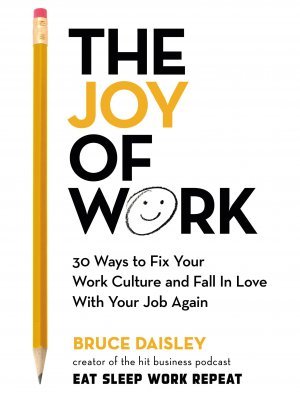Why the need for a book like The Joy of Work?
First, subjectively, I was witnessing the toll that work was taking on the people around me. I include myself in that. Half of all office workers report feeling burnt-out. In very small part that’s because of the fact that when we accepted email onto our mobile phones, the average working day increased from seven and a half hours a day to nine and a half hours a day. That simple extension, that almost joyful availability to swipe away emails while on the sofa, but that extra availability of ourselves to work, has had the consequence of just leaving us feeling intellectually and emotionally frazzled, burnt-out by our jobs. I became obsessed with trying to fix that with the people around me. What I encountered was that, in fact, there’s no shortage of science telling us how we should improve work. It’s just that none of that science ever reaches people who have a job.
...none of that science ever reaches people who have a job.
You’ve split the book into three sections: Recharge, Sync and Buzz. Why?
When any of us try to improve our work cultures, there are some very important parts about improving team dynamics, improving the way that people relate to each other and improving trust and co-operation in teams. However, I also found that if you didn’t first try to improve the mental state of people in those teams, then you’d be trying to stage an intervention that was never going to work. A good example: a charity, a non-profit, came to me a few weeks ago, and said they had tried to change their culture. They had invited everyone to come to a three-hour meeting, and everyone declined. That’s a very familiar pattern of behaviour, we see it all the time: people are in a state where they want to improve their team dynamic and culture, but they’re in a state of exhaustion. So that was it; the first part of the book is about Recharging, it’s about personal interventions that we can all do to make work feel less overwhelming.
Some of the ideas are blindingly obvious, like “focus on one thing at a time”, “get a good night’s sleep”, to name but two. But if they’re so obvious, why are we so bad at doing them?
With regard to the blindingly obvious, probably the first intervention I suggest is to turn notifications off on your phone. If we do that, we find it just gives us a bit of head space, a bit of breathing space, where we don’t feel so claustrophobic about the jobs that we’ve got. So, yes, extraordinarily, blindingly obvious, like taking a lunch break. But we find that when you stage these small edits to the way we work, they seem to have a disproportionate effect. The guy who advised people to turn notifications off on their phone worked for a mobile phone company, Telefonika. He began by trying to get enough people to turn off their notifications for a week. That didn’t happen, so he backtracked and tried to get people to turn off notifications for a day. Two years later, half of all those people still had their notifications turned off. It’s almost as if the solutions to fixing work are sitting right in front of us.
You’ve just mentioned one major change: “go to lunch”. Hasn’t lunch of all forms been outlawed, unless you take it at your desk?
The habit of eating ‘al-desko’ unfortunately started in the US and is grudgingly pollinating its way around the world. But there’s remarkable science with regards to taking a break. For example, the worst time to find yourself in court is just before lunch! Our senses of openness, co-operation, creativity, are all enhanced by taking a break. As we sit there with an InBox that’s jammed with hundreds of unread emails, we think it’s actually counterproductive to take a break. In fact, getting up and taking our lunch break seems to be conducive doing our best work.
This is not just your opinion? It’s all backed by reputable, hard, scientific research?
That’s exactly it. We’ve had enough of people with opinions! I run a podcast*. It started, essentially, as a journey of self-education. I found very quickly that there’s no shortage of CEOs with opinions, but often their opinions are far less helpful than a psychologist with research. I became fascinated with the psychologist who’d worked out how to improve work. Unfortunately, their evidence isn’t reaching people in jobs. That became my mission: get all the opinion out of the room and get the facts into the room.
...turn notifications off on your phone.
Section two, Sync, is about making teams closer. We understand why that’s important. One of the things you suggest, “move the kettle”. What’s that about?
Moving the coffee machine, the water cooler, any device that you’ve got for making drinks… Well, one person I met combined big data and psychology, and he spent time in the same way that perhaps we find ourselves watching a tennis match or a rugby match. We’ll watch heat maps on the screen of where the players have been or where the ball has been.
Geography of the office plays a far more important role in how we work than we’d ever care to admit.
This person wondered if he could use that same process to track where people went in the office? So, he tracked what went on in the office. Based on the data, he was able to tell from the way that people interacted when something was a creative office and when something it was uncreative. In addition, the location of the water machine, the water cooler, the kettle, whatever you want to call it, had as much bearing on who talked to whom in an office, as the org chart of which teams we were in. It seems like a remarkable thing, but we often don’t consider details that are about how the geography of the office is laid out. Geography of the office plays a far more important role in how we work than we’d ever care to admit.
You also call for laughter. I thought laughter, like lunch, had also been outlawed?
In the past, unfortunately, I found myself listening to bad bosses. They’d wander past me and say, “Look, now is not the time to be seen laughing, times are hard, can you make sure you’re not laughing when the big boss comes past?” By extrapolation, I somehow decided that maybe laughing itself was unproductive, wasteful of resources and bad. Later, immersed in studying psychology and how we could work better, I found myself thinking, OK, I’m going to look into the science of laughter. The science of laughter is remarkable because not only does laughter make us more co-operative, collaborative, it makes us trust our team members more and more resilient as a team. In fact, if you look at people who survive plane crashes in the jungle or who get lost at sea, they aren’t Bear Grylls or the earnest explorer types. (In fact, those types seem to go pretty quickly!) The disaster survivors have got almost a sense of the ridiculousness of their plight. They almost laugh every day about how doomed they are. Laughter seems to make us more resilient. So now, when that boss wanders past and says, “Now is not the time to be laughing”, what a good time to unveil the research and say, “On the contrary, now is the time to double down our laughter”.
The book’s final section, Buzz, contains some real gems. “Keep teams lean” is an obvious one, but others are much less so like “Replace presenting with reading”. Surely you can’t be suggesting we do away with PowerPoint!
If we look afresh with child-open eyes at the way we work, we’d be struck by what work has actually become. The average office worker spends between two and three days a week in meetings. Ask someone to candidly describe what they do in those meetings. They’ll tell you that what they do is pretend to look like they’re paying attention. Then we go home exhausted at the end of the day because we’ve had to moderate ourselves. What a remarkable thing. What Amazon has done – and I’m not espousing all aspects of the Amazon culture – is they’ve said that PowerPoint seems to be especially bad for this. So Amazon has eliminated PowerPoint – no one at Amazon uses PowerPoint – but if you’ve got anything to present, you write it in a document and everyone reads the document in silence. The first time you try this, let me tell you, it’s deeply uncomfortable. In fact, the first time you do it, you think you may not do it again because it was so awkward. But if you persist with it, well…people at Amazon say they spend about a third to a quarter of the time in meetings compared to most other companies. Because they’re doing this: they’re getting rid of the performance and getting the facts.
Amazon has eliminated PowerPoint
If we want to restore joy to our workplaces, do we have to implement all 30 of your ideas simultaneously or can we pick and choose a bit?
Pick and choose! Look, I see the book as a troublemaker’s manifesto. You don’t have to be the boss, you can be someone sitting there with those fresh eyes thinking, I just want to make my work a little bit better. All of us can recognise that the day that we received our job offer, we were elated. No one got a job offer and their heart sank. But there’s a weird thing: we go through our honeymoon and then we reach a stage where we’re no longer happy in the jobs that we’ve got, and so consequently my feeling is we should try and use a bit of evidence and make work enjoyable again.
* Eat, Sleep, Work, Repeat – Bruce Daisley – available via Apple Podcasts, Google Podcasts, and similar.






